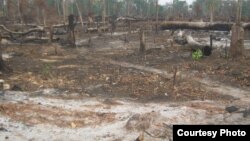WASHINGTON DC - A prominent rights investigator is being sued by a ruling party commune chief in Pursat province. But a closer look shows that Chan Soveth, of the rights group Adhoc, was sued after making public remarks to the media about a ruling party businessman.
Rights groups say this is evidence the courts are still being used to silence government critics, rights workers and those who oppose powerful political or business interests.
Chan Soveth, deputy chief of Adhoc’s program for land and natural resources, is being sued for “incitement,” following remarks made in local media that claim that people in rural areas, like Pursat, are threatened by powerful local officials and business interests.
Chan Soveth told VOA Khmer by phone he did not commit incitement or put out harmful disinformation. “Regarding this land dispute, people are fully speaking out about their conflict with the company.”
Court officials say they are reviewing the case.
Phil Robertson, deputy chief of the Asia division for Human Rights Watch, said the charges are typical of a policy of intimidation through the courts.
“So once again, we are probably going to see another game of trumped-up charges, politically motivated charges, from the Cambodian government against Chan Soveth,” he said in an interview from Bangkok.
Tung Yap, president of the US-based group Cambodian Americans for Human Rights and Democracy, said the case exemplified government use of the courts as a “tool to restrict freedom of speech.”
Rights Worker Sued on Behalf of Powerful Businessman
- Sok Khemara
- VOA Khmer








